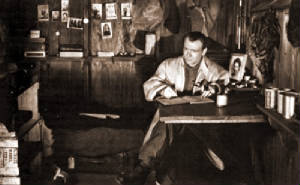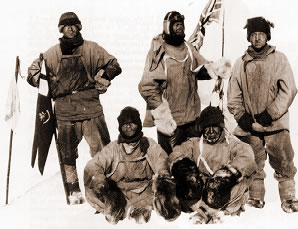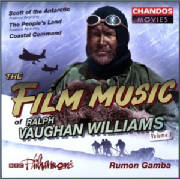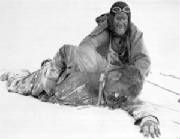|
"To Strive, To Seek, To Find, and Not To Yield."

It is with these words, found carved on the cross that marked the place in the frozen wilderness where they were
found, we begin our look at the man, the place and the intensely brilliant 1948 Ealing film, produced by Michael
Balcon and directed by Charles Frend, Scott of the Antarctic, with an evocvative, beautiful and haunting soundtrack, composed
by Ralph Vaughan Williams.
Let us now hand you over to the author, George Perry, from whose book Forever Ealing, the description of the film,
below, is taken. Get hold of this book, if you can, it stunningly brings to life everything and everybody that was Ealing
Films, of which Scott of the Antarctic is one of the finest examples, if not the finest.
There is something intensely British about Scott of the Antarctic, an epic story of great heroism which
ended in failure. Robert Falcon Scott had already made a name for himself in polar exploration when he set out in 1910 on
an attempt to reach the South Pole. It took two years for his small party to get to it, and when they did they found the Norwegian
flag planted by Roald Amundsen flying there. On the way back everyone perished in the snows, and it was only after a search
party several months later had found the Scott diaries and pieced together the story that Edwardian England was able to thrill
to the courage of a small band of gallant men fighting impossible odds. The film that Ealing made was as worthy as its subject
demanded. The direction was by Charles Frend who had been responsible for the wartime story of epic heroism and survival,
San Demetrio, LondonIt was made in Technicolor, with Jack Cardiff, Osmond Borradaile and Geoffrey Unsworth in charge of photography.
The script by Walter Meade and Ivor Montagu, with sequences by Mary Hayley Bell, leaned heavily on the diaries and Arne Akermark's
art direction gave as authentic a look as possible to the sets and props. As historical reconstruction it looked impeccable,
although it has to be said that there were difficulties in getting approval from all the survivors of the expedition, particularly
Lord Mountevans, formerly Lieutenant Evans, who had objected to his namesake and companion, Petty Officer Evans, being chosen
by Scott for the final dash to the Pole. John Mills played Scott, a popular choice as he had established his reputation portraying
level-headed, stiff upper-lipped men of courage. The supporting cast included Harold Warrender as Wilson, Derek Bond as Oates,
Kenneth More as Lieutenant Evans, James Robertson Justice as Petty Officer Evans, Reginald Beckwith as Bowers and Diana Churchill
as Scott's wife.
Location photography was shot in Grahamland, Switzerland and Norway - in the first, which was in Antarctica
itself, without any actors. In addition, there were many hazardous scenes filmed at Ealing on a sound stage covered in 'fluff',
as the revolting artificial snow was called. Because of the difficulties of location shooting it had been decided to use the
then new Technicolor monopack system which did away with the cumbersome three-strip camera, and their seventy pounds of film
magazines, but it was not so easy to get the new stock from America. The beautiful documentary footage shot on the original
expeditions on black-and-white nitrate stock by the great Herbert Ponting was studied closely and some shots were even accurately duplicated. The final touch to enhance the picture's prestige was
the vibrant, atmospheric score by Ralph Vaughan Williams, one of the composer's rare and most successful forays into film
music, and a triumph for Ealing's musical director, Ernest Irving. Although there is a tendency nowadays to scoff at hagiographies
of national heroes, it would be unfair to deny Scott of the Antarctic its excellence. It is a cool, carefully-stated
account, which does not flinch from showing the casual, gentlemanly way in which Scott made his plans, leaving far too much
to chance and good fortune than was prudent for a determined explorer. He had the ambition, but not the ruthlessness.
Extract© George Perry: Forever Ealing.

|
 |
|
![Scott of The Antarctic1948[click for larger image]](sitebuildercontent/sitebuilderpictures/.pond/scottoftheantarctic1948.jpg.w300h225.jpg)
the webpages at screenonline
at the British Film Institute
written as he "faced the inevitable"
while trying to return from the
South Pole in 1912.

Main Titles*
Prologue
Doom*
Sculpture Scene*
Ship's Departure*
Ice
Floes*
Penguin
Dance
Aurora*
Pony March
Blizzard
Distant Glacier
Climbing the Glacier
Scott on the Glacier*
Snow
Plain*
The
Return
Descending on the Glacier*
The Deaths of Evans and Oates*
End Titles
*denotes premiere recording
conductor
Merryn Gamba
soprano
organ

The Antarctic
Heritage Antarctica is a coalition
of national Antarctic Heritage Trusts,
which have come together to:
" "Promote the restoration, preservation
and protection of the structures,
artefacts and records which reflect
the history of human endeavor in
Antarctica, as a means to increase
understanding of the importance of
the Antarctic environment and as
an inspiration for future generations."
a component of the
Natural Environment Research Council.
Based in Cambridge UK,
it has, for almost 60 years,
undertaken the majority of
Britain's scientific research on
and around the Antarctic continent.
It now shares that continent with
scientists from around thirty countries.
The British explorer Robert Falcon Scott
might have survived his
ill-fated expedition to the South Pole
in 1912 if it were not for a freak cold snap.
from the BBC Science Archives
"the story of Scott's last
expedition
to the South Pole will, I feel
sure,
be already known to many
of you here tonight and
several of you may remember
the times in which that
epic journey was made"
with contemporary photographs
courtesey of
The National Maritime Museum,
Greenwich, UK
|
 |
|
|
 |
|
|
|

